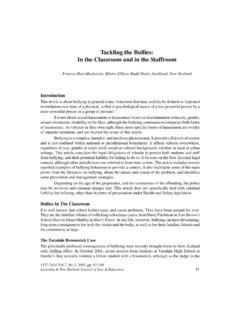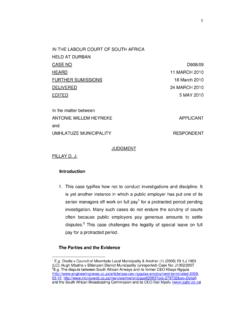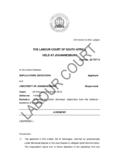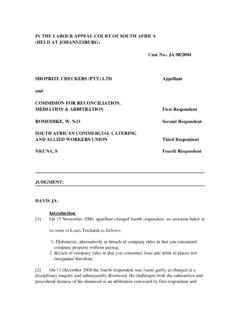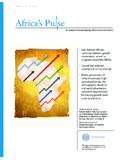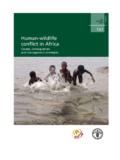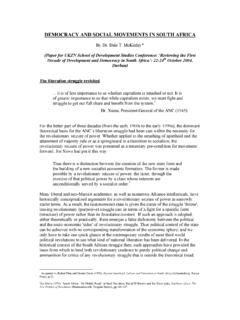Transcription of A History of Educational Law in South Africa: An ...
1 1327-7634 Vol 3, No 2, 1998, pp. 61-73 Australia & New Zealand Journal of Law & Education 61 A History of Educational Law in South africa : An Introductory Treatment Izak J. Oosthuizen Graduate School of Education, PUCHE, Potchefstroom, South africa & Johann L. Beckmann Faculty of Education, University of Pretoria, Pretoria, South africa Abstract Educational Law has come a long way in South africa since the early 1970's. The early 1980's saw the dawning of Educational Law. During those years Educational Law was presented as a theme in support of certain applicable subjects at a few isolated tertiary institutions in South africa . The 1980's witnessed the growth of Educational Law from a subject within the framework of Comparative Education to a well-recognised subject in graduate degrees for Educational Management and Administration.
2 The 1980's also witnessed the publication of the first book on Educational Law : The Law of Education for the Teacher by Van Wyk. In the 1990's Educational Law exploded in South africa when the first national and international conferences in Educational Law were held. These were followed by the establishment of the South African Association for Educational Law and Policy (SAELPA) and the Inter-university Centre for Educational Law and Educational Policy (CELP). Introduction In 1972 Potgieter found that Educational Law was not a well-known theme among the South African school principals. In his research for Die problem vau ver gelyking en evaluering in die pedagogiek, he drafted a list of 25 topics and his respondents (school principals) had to arrange them in order of importance and applicability in regard to their daily task fulfilment. After the responses had been processed and analysed, it became apparent that education law was the least important theme, as it ended up number 25 on the list.
3 Among the reasons for this surprisingly low ranking given at that time to a field which has since leapt to prominence are the following: The absence of a bill with justiciable fundamental rights in the South African Constitution at the time. The fact that at that time educators had no access to fundamental labour rights but were employed in terms of service relationships. These left them in a rather weak position vis- -vis their employers who were in a superior position, having decision-making power in all matters concerning educators conditions and terms of service. This subordinate position of educators as employees was compounded by the fact that labour relations were governed largely by Administrative Law focusing on the legality of decisions and of 62 Izak J. Oosthuizen & Johann L. Beckmann actions. The legality of decisions is harder to challenge than the notion of unfair practices which was introduced in the Education Labour Relations Act, 1993 (Act 146 of 1993).
4 In terms of the principle of vicarious liability, educators were to a large extent sheltered from the possible consequences of negligence. The Government was its own insurer, and employers and claimants often settled claims against teachers out of court. The above ideas should not be seen to be suggesting that there was no body of law identifiable as Educational Law . They do suggest that such knowledge was not systematised and that educators and other role-players were largely ignorant of it. The Pioneering Years There are several significant milestones in the development of Educational law in South africa . The 1977 the Master s dissertation of van Wyk (Van Wyk, 1977) under the supervision of Stone could be regarded as the beginning of the study of Educational Law in South africa . It was written in the field of Comparative Education and it concentrated on certain juridical-pedagogical aspects of the South African education system namely employment and dismissal of teachers in the Transvaal and Cape Education Departments (Van Wyk, 1977: I).
5 Although other dissertations had dealt with aspects of the law that could be included in the corpus of Educational Law knowledge, they were written first and foremost as contributions to the corpus of legal knowledge and their application to the management and administration of schools and other Educational institutions was at best of secondary importance. Subsequently, a book on professional orientation for the teaching profession by De Witt in 1979 contained two chapters focusing on aspects of Educational Law. One dealt with teacher liability for the safety of pupils and the other with an analysis of the professional conduct of teachers. In 1980 Van Wyk in his doctoral thesis in Comparative Education, focused on aspects of the law pertaining to education, with special reference to the training of teachers in South africa and a number of other countries (Van Wyk, 1980: iii). One of the major recommendations emanating from his thesis was that student teachers should systematically study all juridical regulations and that this aspect of teachers training be called Juridical Pedagogics (Van Wyk, 1980:4).
6 It was suggested inter alia that Educational Law should be regarded as a separate discipline. His suggestion was soon acted on by the University of South africa (UNISA) which included Educational Law as a theme in certain modules of training for the Bachelor s Degree in Education ( )., which is a postgraduate degree offered by most Faculties of Education in South africa . This set the trend to be followed by other South African universities half way through the 1980's when Educational Law was included as a theme in the for Educational Administration and Management course at the Universities of Pretoria and Potchefstroom. In 1981 Professor van Wyk published the first comprehensive book on Educational Law in Afrikaans. The English translation: The Law of Education for the Teacher was published in 1983. It focused on aspects of the law that pertain directly to the rights and duties of teachers. In a Doctor of Education thesis (1985) Beckmann synthesised the rights and duties of teachers, children and parents in three separate chapters.
7 This work was later included in books by Landman & Beckmann (1987) and Prinsloo & Beckmann (1987). The latter attempted to A History of Educational Law in South africa : An Introductory Treatment 63 systematise the legal principles and rules applying to children, educators and parents in regard to education. It included an analysis of the legal provisions regarding the education system at the national level as well as chapters on discipline and punishment in schools and professional registration of teachers. After having completed a research project on the national standing of Educational Law as a component of teachers training in South africa , Prof. Van Wyk published his findings in 1987. Represented in the study population were South African Universities, Technikons and Colleges of Education. Some of the major findings included: the fact that Educational Law did not manifest as a separate subject in any of the teachers training programmes at any of the tertiary institutions.
8 However, it manifested as a significant theme in managerial courses for students at South African Universities. Further he found that where Educational Law was offered, it was not presented in a systematic way. As far as the utilisation of sources on Educational Law was concerned, it was found that secondary sources were mostly utilised and that original juridical sources received very little attention. The syllabi concentrated mainly on issues relating to the education system and Educational management (Van Wyk, 1987: 52). From the middle of the decade on the ownership of Educational Law as a theme moved from the field of Comparative Education to the field of Educational Management and Administration. Oosthuizen (1986 & 1987) completed the first Master s and Doctor s degrees in the field of Educational Administration and Management dealing specifically with Educational Law issues. In the latter it was proposed that Education Law should be regarded as an independent field of study and not as a theme or a supplement to any other subject.
9 Van der Westhuizen and Oosthuizen (1989: 743) furthered this argument by positing that Educational Law should not be reduced to a field of study within the juridical modality. They argued that it should be viewed as being an autonomous societal phenomenon within creation. After they had analysed Educational Law according to characteristics present in reality, they came to the conclusion that the nature of Educational Law is to be found in security, which is facilitated by authority. The Promotion of Educational Law National and International Conferences Several conferences have been supported by Potchefstroom University at the Graduate School of Education. In 1990 held the first national symposium on Educational Law. This was followed by two further symposia at Potchefstroom in 1993 and 1994. In 1995 the Graduate School of Education held the first international Educational Law Conference. Overseas speakers participating in the conference travelled from the United States of America (5), Australia (3), Canada (1) and Nigeria (1).
10 The South African Association for Educational Law and Policy (SAELPA) The South African Association for Educational Law and Policy (SAELPA) was established on 17 October 1995 with the support and co-operation of the Belgian (Flemish), Dutch and European 64 Izak J. Oosthuizen & Johann L. Beckmann Associations for Educational Law and Policy under the leadership of Proff. Jan de Groof (Ghent University) and Piet Akkermans (Erasmus University, Rotterdam). SAELPA s first elected chairperson was Prof. Johan Beckmann of the University of Pretoria. Prof. Elmene Bray of UNISA was elected as Vice-chair and Dr. Jan Heystek of Pretoria as Secretary. The main goals of SAELPA are to promote, develop and study Educational Law and Policy and to make effective contributions towards enhancing freedom, equity and quality in education and training in South africa . SAELPA also aims to promote understanding of these fields of knowledge in all interested parties.
